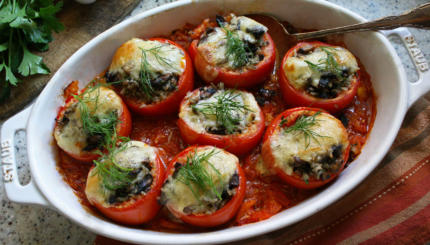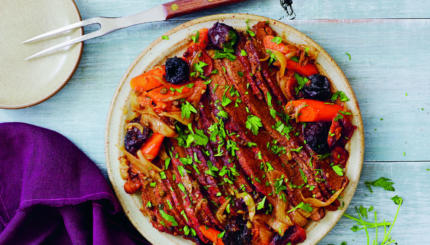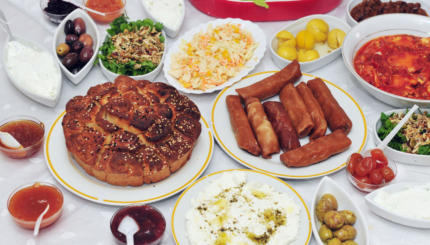Vegetarian Stuffed Cabbage
Rolled foods that resemble a Torah are traditional on Simchat Torah.
Simchat Torah celebrates both the conclusion of the annual Torah reading cycle and the beginning of a new one. Because the holiday centers on the cherished scroll, rolled foods that resemble a Torah have become a traditional part of the day’s cuisine. Stuffed cabbage, in particular, has a special place on the Ashkenazic Simchat Torah table. Also known as holishkes and golabki, these savory pouches originated in Eastern Europe.
Here are two recipes for rolled foods for Simchat Torah, or any other time. Rather than using the traditional lamb or beef mixtures that often fill cabbage leaves or cigar pastries, these fillings are vegetarian.
The lentil-mushroom filling mimics the look and texture of the traditional meat-filled cabbage leaves that you might remember from your mother’s or grandmother’s kitchen.
The zesty chickpea filling is inspired by the combination of mashed chickpeas and curry that fills the pocket pastries known as sambusaks or sambuskas. Based on a Middle Eastern recipe, this next filling is adapted from sooogood.org.
Ingredients
2 15-oz. cans chickpeas, partially drained
1 tsp curry powder, or to taste
2 cloves garlic, minced
1/2 bunch parsley, rinsed and chopped (about 1 cup loosely packed)
2 Tbs olive oil
1 small onion, chopped
Salt and pepper to taste
2 tsp balsamic vinegar or 3 Tbs red wine (or to taste)
1 medium carrot, grated
3-4 cups cooked green (brown) lentils (use 2 cans, or cook 1 cup dry lentils and reserve some of the liquid)
1 8-oz package white mushrooms or 3-4 portabella mushrooms, including stems, chopped
1/4 cup olive oil
1 small onion, chopped
28-oz can crushed fire-roasted tomatoes, left chunky or puréed
3 cups of your favorite simple tomato sauce, tomato juice, or 1 to 2 Tablespoons tomato paste mixed with 1/2 cup water
Salt and pepper to taste
1 medium-large head green cabbage
1 Tbs lemon juice
Directions
Cabbage and Sauce Preparation
Core the cabbage by turning it upside-down and cutting in a circle around the center. You should cut out a piece that looks like a cone and contains the tough inner part of the cabbage.
Boil a large pot of water.
Using tongs or a large grilling fork, grasp the cabbage head and lower it into the boiling water. Boil for 5 minutes, rolling the cabbage to rest on a different side about halfway through.
Using the same tongs or large fork, remove the cabbage from the water. Let the hot water drain off into the pot, leave the heat on under the pot of water, and remove the cabbage to a work surface. Allow to cool a bit, rinsing in cold water if desired to speed the process.
Remove the softened, translucent outer leaves. Return the uncooked part of the cabbage to the boiling water for another 5 minutes, turning once, to allow the next layer of leaves to soften. Then remove the cabbage from the pot and peel off the soft leaves. Repeat this process until all leaves have been cooked.
When all the leaves are cool enough to handle, slice off the top of the large vein in each leaf, or cut it out completely. Slice especially large leaves in half.
Combine the sauce ingredients and set aside. If using the fire-roasted crushed tomatoes, have on hand.
Lentil-Mushroom Filling
Heat olive oil in a large skillet (choose one with a lid so you can use the same skillet for simmering the cabbage rolls later). When hot, add onions. Sauté for a few minutes, then add the mushrooms and sauté on medium-high heat until they begin to brown and shrink. Add the carrot and sauté another minute. Add the lentils, salt, and vinegar or wine, then bring to a simmer for a few minutes. Mash the lentils with a potato masher. Continue to simmer, uncovered, until they are the consistency of moist refried beans. Remove from heat and add additional salt and pepper to taste.
Remove from the skillet and rinse the skillet. Add a little of the sauce to coat the bottom. Then start making the rolls as described after the next filling.
Zesty Chickpea Filling
Heat olive oil in a large skillet (choose one with a lid so you can use the same skillet for simmering the cabbage rolls later). When hot, add onions. Sauté for a few minutes, until translucent.
Add garlic and continue to sauté until beginning to brown. Add parsley and curry powder, and sauté another minute.
Add garbanzo beans, with their liquid, and lemon juice.
Simmer and mash with a potato masher. Continue to simmer until the mixture is the consistency of moist refried beans.
Remove from the skillet and rinse the skillet. Add enough of the tomato sauce to coat the bottom. Then start making the rolls.
Assembling and Cooking Stuffed Cabbage Rolls
Place a cabbage leaf on a work surface with the wide side facing you and the sliced-out center (where the vein used to be) vertical.
Bring together the split sides of the leaf and overlap.
Add 1/4 to 1/3 cup of filling in the bottom of the leaf (where the vein was cut out) and roll up, away from you. You’ll notice that the leaf’s natural curve makes this easy to do.
When you finish rolling each leaf, place it in the tomato sauce, seam side down, in a single layer in the prepared skillet or pot.
When the rolls are all ready and arranged in the pan, pour in enough sauce to cover the rolls. Bring to a boil and reduce heat.
Simmer on low, covered, for about 25 minutes. If sauce has thickened, heat additional sauce to pour over the rolls before serving. Or allow to cool and then store in a well-sealed container for up to three days, then reheat.
Serve with a dollop of sour cream or yogurt, if desired, alongside rice pilaf, tabbouleh or a tossed salad.



